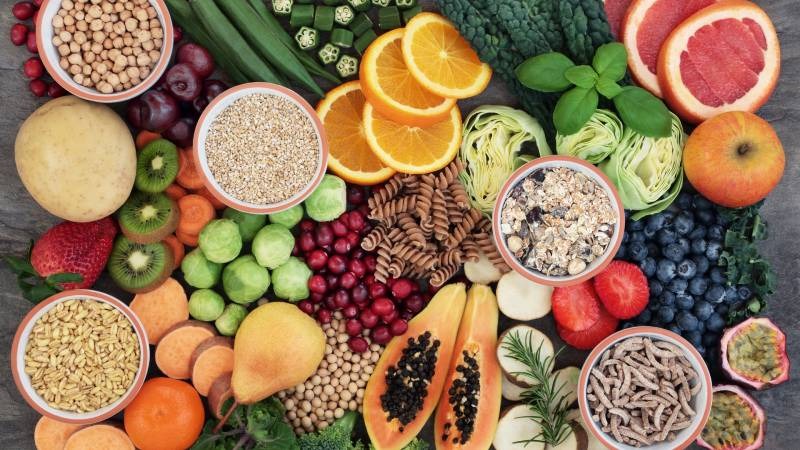
Each month, millions of women experience a range of discomforts associated with their menstrual cycle. From painful cramps to bothersome bloating and mood swings, period symptoms can significantly impact daily life. While medication can offer relief, many women are also seeking more natural ways to manage these discomforts. The good news is that your diet can play a significant role in alleviating period symptoms. This article will delve into how you can adjust your eating habits to ease period discomfort and feel better during those days of the month.
Understanding Menstrual Discomfort (PMS)
Menstrual discomfort, often referred to as Premenstrual Syndrome (PMS), encompasses a wide array of physical and emotional symptoms that women experience in the one to two weeks leading up to their period. Common symptoms of PMS include:
- Bloating
- Abdominal cramps
- Headaches
- Mood swings (irritability, anxiety, sadness)
- Fatigue
- Breast tenderness
- Changes in appetite
- Trouble sleeping
While the exact cause isn't fully understood, PMS is widely believed to be linked to the hormonal fluctuations of estrogen and progesterone that occur during the menstrual cycle. Although hormones are the primary driver, lifestyle factors, such as diet, can significantly influence the severity of PMS symptoms.
The Link Between Diet and Menstrual Discomfort
The foods you eat can directly impact how your body responds to the hormonal shifts of your menstrual cycle. Certain nutrients and food components can affect inflammation, hormone balance, fluid retention, and neurotransmitter levels, all of which are involved in PMS symptoms.
- Sugar, Salt, Caffeine, and Alcohol: These substances can exacerbate certain PMS symptoms like bloating, mood swings, and fatigue.
- Processed Foods: Often high in sodium, unhealthy fats, and additives, which can contribute to inflammation and worsen discomfort.
- Anti-Inflammatory Foods: Foods rich in antioxidants and omega-3 fatty acids can help reduce inflammation, potentially easing cramps and pain.
- Foods Rich in Specific Vitamins and Minerals: Nutrients like magnesium, calcium, vitamin B6, and iron have been shown to help alleviate specific PMS symptoms.
- Hydration: Staying adequately hydrated can help reduce bloating and fatigue.
Key Nutrients for Relieving Period Discomfort
Incorporating the following key nutrients into your diet may help alleviate period discomfort:
- Magnesium: Magnesium is a mineral that helps with muscle relaxation, which can be effective in easing menstrual cramps and headaches.
- Food Sources: Dark leafy greens (like spinach and kale), nuts (like almonds and cashews), seeds (like pumpkin and chia seeds), dark chocolate (70% cacao or higher).
- Calcium: Not only is calcium crucial for bone health, but research suggests it may also help alleviate PMS symptoms, including mood swings and bloating.
- Food Sources: Dairy products (like milk and yogurt), dark leafy greens, fortified plant-based milk, tofu.
- Vitamin B6: This vitamin is involved in the production of neurotransmitters and may help improve mood swings and reduce fatigue.
- Food Sources: Poultry, fish, bananas, potatoes.
- Omega-3 Fatty Acids: These essential fatty acids have anti-inflammatory properties and may help reduce menstrual cramps and pain.
- Food Sources: Fatty fish (like salmon, mackerel, and sardines), flaxseeds, chia seeds, walnuts.
- Iron: Blood loss during menstruation can lead to lower iron levels, potentially exacerbating fatigue. Ensuring adequate iron intake is important.
- Food Sources: Red meat, spinach, lentils, beans.
- Fiber: Fiber helps regulate hormone levels and improves digestion, which can potentially reduce bloating.
- Food Sources: Whole grains (like oatmeal and brown rice), fruits, vegetables, legumes.
- Vitamin D: While more research is needed, vitamin D may play a role in mood regulation and overall well-being during the menstrual cycle.
- Food Sources: Fatty fish, fortified foods, sunlight exposure.
- Vitamin E: This antioxidant may help reduce breast tenderness.
- Food Sources: Nuts, seeds, vegetable oils.
Foods to Embrace During Your Period (and Before)
Focus on incorporating the following foods into your diet in the days leading up to and during your period to help ease discomfort:
- Hydrating Foods: Water, herbal teas, soups, and fruits and vegetables with high water content (like watermelon and cucumbers). Staying hydrated can help reduce bloating and fatigue.
- Magnesium-Rich Foods: Include spinach, kale, almonds, pumpkin seeds, and small amounts of dark chocolate in your diet to help relax muscles and ease cramps.
- Calcium-Rich Foods: Consume yogurt, milk, cheese, fortified plant-based milk, tofu, and leafy greens to support mood stability and reduce bloating.
- Vitamin B6-Rich Foods: Incorporate chicken, turkey, salmon, tuna, bananas, and potatoes into your meals to help regulate mood and combat fatigue.
- Omega-3 Rich Foods: Aim to eat fatty fish like salmon, mackerel, or sardines a few times a week. You can also boost your omega-3 intake with flaxseeds, chia seeds, and walnuts.
- Iron-Rich Foods: If you're feeling fatigued, make sure you're getting enough lean red meat, spinach, lentils, beans, and fortified cereals.
- Fiber-Rich Foods: Eat oatmeal, brown rice, quinoa, whole-wheat bread, fruits, vegetables, and legumes to help regulate hormones and improve digestion.
- Foods with Natural Anti-Inflammatory Properties: Incorporate ginger and turmeric into your diet, as they possess powerful anti-inflammatory properties that can help alleviate pain and discomfort. Berries are also rich in antioxidants, which can help fight inflammation.
Foods to Limit or Avoid During Your Period (and Before)
Certain foods and beverages can worsen PMS symptoms. Try to limit or avoid the following in the days leading up to and during your period:
- Salty Foods: Processed foods, salty snacks, and canned goods can lead to water retention and bloating.
- Sugary Foods and Drinks: Candy, soda, and pastries can cause blood sugar spikes and crashes, potentially exacerbating mood swings and fatigue.
- Caffeine: Coffee, black tea, and energy drinks can increase anxiety, irritability, and breast tenderness.
- Alcohol: Alcohol can worsen mood swings, fatigue, and bloating.
- Processed Foods: These are often high in sodium, sugar, and unhealthy fats, which can contribute to inflammation and worsen PMS symptoms.
- Excessive Red Meat: For some individuals, excessive red meat consumption may contribute to inflammation.
- Dairy (for some): If you are lactose intolerant, dairy products may worsen bloating and digestive issues.
- Excessive Highly Processed Soy Products: For some individuals, excessive consumption of highly processed soy products may interfere with hormone balance.
Sample Meal Plan for Managing Period Discomfort (1 Day)
Here's a sample meal plan focused on alleviating PMS symptoms to give you an idea of how to structure your meals:
- Breakfast: Oatmeal with berries, chia seeds, and a small handful of almonds. A cup of ginger tea.
- Lunch: Grilled salmon salad with mixed greens, avocado, and an olive oil and vinegar dressing.
- Dinner: Chicken and vegetable curry with brown rice and plenty of spinach.
- Snacks: A small handful of walnuts, a few celery sticks with hummus, a small square of dark chocolate.
Other Dietary Tips for Menstrual Health
- Eat Smaller, More Frequent Meals: This can help stabilize blood sugar levels and reduce bloating.
- Stay Hydrated: Drink plenty of water throughout the day.
- Consider Herbal Teas: Chamomile, ginger, and peppermint tea can help with relaxation and digestive issues.
- Be Mindful of Portion Sizes: Avoid overeating, which can worsen bloating.
- Listen to Your Body: Pay attention to how different foods affect your symptoms.
- Consider Supplements (with caution and professional advice): Supplements like magnesium, calcium, vitamin B6, and omega-3s may be helpful, but it's crucial to consult with your doctor or a registered dietitian before starting any supplementation.
Lifestyle Factors That Complement Diet
Alongside diet, other lifestyle factors play a crucial role in managing PMS symptoms. Regular exercise, sufficient sleep, and stress management techniques can all contribute to easing period discomfort.
When to Seek Professional Help
If your period discomfort is severe, interferes with your daily life, or doesn't improve with dietary and lifestyle changes, it's important to consult with a healthcare professional.
Conclusion
By making thoughtful choices about your diet, you can significantly alleviate period discomfort. Focus on incorporating whole, nutrient-rich foods and limiting or avoiding those that can exacerbate symptoms. Remember that every body is different, so it may take some experimentation to find what works best for you. Embrace the power of nutrition and take control of your menstrual health to feel better during those days of the month!



















